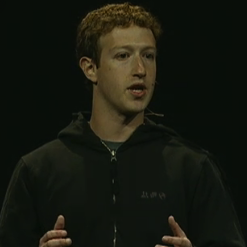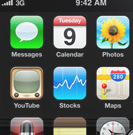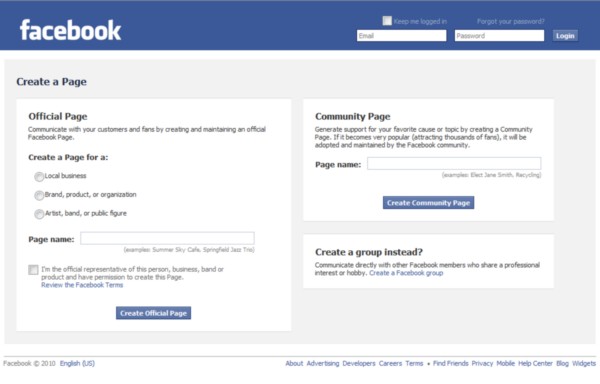
Docs.com: The surest sign yet of Microsoft's defeat
Facebook CEO Mark Zuckerberg made some amazing announcements yesterday, during the f8 conference. Docs.com wasn't one of them.
"You can discover, create, and share Microsoft Office documents with your Facebook friends," according to the service's Website. What Docs.com really does more is provide Microsoft a lifeline, as the company seeks to maintain the relevance of its Office-Windows-Windows Server applications stack before the rising mobile device-to-cloud applications/services stack. Docs.com is a futile, short-sighted enterprise that acknowledges Microsoft has already lost the new century's platform wars.

A broadband plan of sorts goes forth, with muted net neutrality
The strategy being employed by the Federal Communications Commission, as put forth yesterday, is to treat its loss to Comcast in DC Circuit Court two weeks ago not as a defeat of its ability to implement the entire Broadband Plan...and then hope that no one puts up any new roadblocks toward deploying at least most of it.
The priorities the FCC put forth during yesterday's open hearing are perhaps the ones that would generate the least friction from possible opponents. One of these priorities is reflected in a major rule change yesterday with respect to what regulators originally thought should be an oxymoron: home roaming.

Marvell unveils 1 GHz chips that consume just 1 watt of power
Chipmaker Marvell today debuted a new processor in its Armada family, designed for plug computing, for home, small business and industrial automation, and applications demanding ultra low power consumption.
The Armada 310 system-on-a-chip is built with an ARMv5 processor between 500 MHz and 1 GHz that consumes less than 1 watt of power. Fixed on a 15 x 15mm FCBGA (Flip Chip Ball Grid Array), the Armada 310 offers tons of I/O options, such as two Gigabit Ethernet MACs, two SATA 2.0 ports, two PCIe ports, USB 2.0, and DDR2/3.

With Microsoft's and Google's help, Facebook assembles, like, a platform
At its f8 developers' conference in San Francisco this morning, Facebook CEO Mark Zuckerberg presented his vision of a cross-site social platform whose developmental state may already be quite far along. Essentially, he sees a kind of online social sphere wherein anything one communicates that he likes, gets channeled to Facebook, where that like becomes a public fact.
"Today, the Web exists mostly as a series of unstructured links between pages. And this has been a powerful model, but it's really just the start," said Zuckerberg. "The Open Graph puts people at the center of the Web. It means that the Web can become a set of personally and semantically meaningful connections between people and things. I am friends with you. I am attending this event. I like this band. These connections aren't just happening on Facebook, they're happening all over the Web. And today, with the Open Graph, we're going to bring all of these together."

Latest ACTA draft finally released, ISP 'safe harbor' limitations considered
As promised, the world's trade negotiators have finally released a public and, to a limited extent, redacted version of the current draft document for the Anti-Counterfeiting Trade Agreement. Releasing a draft of a global trade agreement is actually unprecedented, say many diplomats.
Though the authors of certain passages under consideration -- many of them marked by [square brackets] -- have been redacted from public view, it's clear that new legal limitations on an Internet service provider's ability to claim "safe harbor," excusing it from secondary liability for copyright (or patent) infringement, are being considered. That option is believed to have been proposed by the United States delegation, as indicated by a leaked document from the European Union (PDF available here from Wired). However, another option that would not limit ISP safe harbor provisions, is listed in the draft document under equal consideration.

Will iPad cannibalize Mac sales?
Clearly Apple is preparing for such a circumstance, or that's my interpretation of last night's fiscal 2010 second quarter earnings call. The question isn't if iPad will cannibalize Mac sales but when. If the cannibals are coming, they'll first strike during back-to-school buying season.
Apple CFO Peter Oppenheimer tipped off the company's thinking early in the conference call: "We expect gross margins to be about 36 percent down from 41.7 percent in the March quarter and reflecting approximately $36 million related to stock based compensation expense. We expect about 25 percent of the sequential gross margin decline to be driven by the first quarter of iPad sales." Whoa, one-quarter?

Adobe gives up on Flash for iPhone and iPad, but leaves the door open
In an indirect yet obvious way, Section 3.3.1 of Apple's new iPhone developers' agreement binds developers to a promise that whatever they bring to the iPhone will be created exclusively for the iPhone. It effectively bans the use of cross-platform tools or middleware like Adobe Flash, by saying anything Apple approves must be coded in the company's own Objective-C, or in C or C++.
If Adobe were to have proceeded with its previous plans to forge an official, working Flash platform for iPhone, that would have been the defiant move. Instead, Mike Chambers, the company's product manager for Adobe Integrated Runtime (AIR), found himself yesterday afternoon sounding the retreat.

Twelve billion iBalls fall into Gizmodo's lap
What's a mobile device prototype worth?
Depends on who you are. If you're Apple, it's priceless. When you tightly control every aspect of the product development process, anything that subverts the message is a potential risk to the brand. Loss of control to a company like Apple is unthinkable. If you're Gizmodo, the answer is $5,000 -- which is the amount the tech blog reportedly paid to an unnamed individual who supposedly found the prototype of Apple's upcoming fourth-generation iPhone in a California bar.

Firefox starts reining in Flash, Silverlight, QuickTime
Download Mozilla Firefox 3.6.4 public beta for Windows from Fileforum now.
Starting today, an ambitious project from the Mozilla Foundation called "Lorentz" makes its first public, experimental debut, with the release of a public beta of Firefox 3.6.4. Mozilla doesn't often promote a public beta of a point release, but this time, the organization needs data from the field regarding the stability of a critical new feature that could help it regain lost traction against competitors Google, Opera, and Apple.

Apple Q2 2010 by the numbers: Best non-holiday quarter ever
Can nothing stop Apple?
The Cupertino, Calif.-based company's quarterly earnings again rose high above Wall Street consensus, which already was $600 million to $1 billion above guidance. Today, after the bell, Apple reported $13.5 billion revenue and net profits of $3.07 billion, or $3.33 a share, under the new reporting method implemented last quarter. A year earlier, Apple reported revenue of $9.08 billion and $1.62 billion net quarterly profit, or $1.79 per share. Fiscal 2010 second quarter ended March 27, 2010.

Another service named 'Buzz?' What gives?
Today, AT&T Interactive launched Buzz.com in beta, the company's answer to entertainment search and recommendation site Yelp. If you think you've seen it before...well, you haven't -- not this, anyway.
The word "Buzz" was employed liberally throughout the 1990's to describe successful alternative rock groups. Pretty much any non-pop band that sold 500,000 albums in that era was classified as a "buzz bin" artist by MTV. By 2004, it was worn out.

Global privacy leaders to Google: We hope Buzz taught you a lesson
Google Buzz should not have changed Gmail to such an extent that its existing users found themselves sharing personal information on a social network without their consent. That's the message sent in a letter to Google CEO Eric Schmidt yesterday, made public today by Canada's Privacy Commissioner, Jennifer Stoddart.
In that letter, Stoddart and her counterparts from nine countries asked Google to provide them with a report about the lessons the company has learned from the Buzz experience, and how those lessons will improve the way Google rolls out products in the future.

3G iPads, new AT&T data plans, arrive on April 30
In light of all the controversy about the lost iPhone prototype which was found and reportedly sold to the media, there was a brief loss of focus from Apple's iPad tablet yesterday.
Don't worry, it's back.

Apple should sue Gizmodo over stolen iPhone prototype
Gizmodo was wrong to acquire a lost iPhone prototype -- quite likely a nearly finished version 4 design -- let alone pay to obtain it. Perhaps this marks the distinction between bloggers and journalists. I would have contacted Apple about returning a device so obviously stolen. There is grave difference between obtaining secret information for the public good and what Gizmodo did: Obtain property containing trade secrets belonging to a public company. Gizmodo has violated the public trust and broken the law. Free speech isn't a right to pay freely for something clearly stolen.
I typically reserve this kind of treatise on journalistic ethics for my Oddly Together blog, where in late March I posted "The Difference Between Blogging and Journalism." Betanews founder Nate Mook asked me to write something here about the journalistic and legalistic ethicacy of Gizmodo's actions. I simply couldn't refuse.

New Facebook 'Connections' may expose users' likes, filter likes from profiles
Facebook's privacy policy, like its services, is an evolving organism. Recently, that evolution has been reactive rather than pro-active. Another reaction may be in the works after today's announcement of a new Facebook feature that enables users to subscribe to personal interests or "likes," officially called "Connections," the way they connect to other users.
The company said today there's a new way for a Facebook user to block others, including friends, from seeing one's "connections" -- the list of pages that represent things one likes to do (e.g., snowboarding) or to partake in (e.g., classical music), or people they may enjoy who may not be represented by their own Facebook pages (e.g., Bertrand Russell, Elvis Presley). But someone who's perusing the page for people or things that Facebook users vote that they "Like" (which replaces "Become a Fan Of" today) may still see the list of everyone who has voted she likes something, the company also said -- indicating that one's likes may never be completely private.



